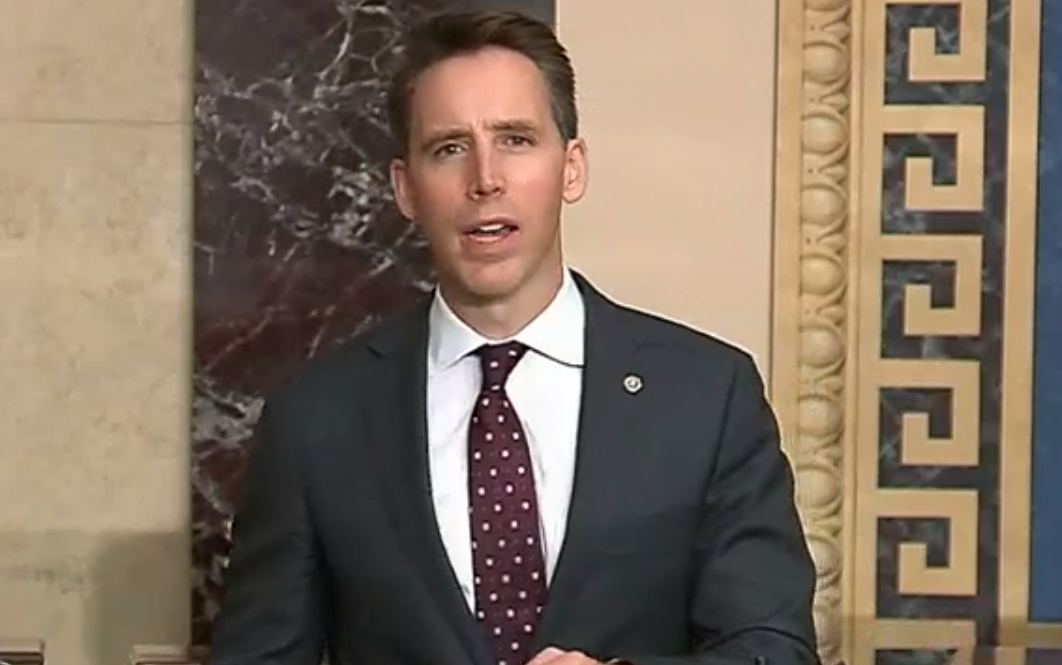Hawley Slams Big Tech in Call for Bill Vote
Uses motion to attack online platforms

The smarter way to stay on top of the multichannel video marketplace. Sign up below.
You are now subscribed
Your newsletter sign-up was successful
Sen. Josh Hawley (R-Mo.) tried unsuccessfully Thursday (Sept. 24) to get the Senate to fast-track passage of his bill allowing individuals to sue social media companies for selectively censoring political speech. Since it was almost certain to fail--a single objection ends the fast track effort--it was more of a chance to slam Big Tech on the Senate floor.
Hawley's attempt was in the form of a motion for unanimous consent (UC), preceded by an impassioned attack on tech. The co-author of social media's Section 230 immunity, which Hawley's bill targeted, immediately rose to strenuously object as well as to complain that Hawley had not given him a heads-up that the motion was coming.
Related: GOP Senators Introduces Sec. 230-Targeted Bill
Hawley's "Limiting Section 230 Immunity to Good Samaritans Act" would limit web sites' Sec. 230 immunity from civil liability for third party content by eliminating it unless the sites "update their terms of service to promise to operate in good faith." They would also agree to pay attorneys fees and $5,000 to each Web site user if it was proved they had violated that promise, which for some Big Tech giants could amount to billions of dollars.
Under the bill:
1. "Users could sue the major Big Tech companies for breaching their contractual duty of good faith;
2. "The duty of good faith would contractually prohibit Big Tech from: Discriminating when enforcing the terms of service they write (just like police and prosecutors are not supposed to discriminate when enforcing the law); "Failing to honor their promises;
The smarter way to stay on top of the multichannel video marketplace. Sign up below.
3. "Big Tech companies who breach their duty of good faith would have to pay $5,000 plus attorney’s fees to each user who prevails."
Hawley is actually not alone, either in his party or on the other side of the aisle, in wanting to reform Section 230 to require social media sites to take more responsibility for how they moderate content.
Hawley's UC motion came in a week packed with Section 230/social media-related activity. That included a hearing in the House on social media Thursday about online extremism as well as the Trump Administration's drafting of Section 230-related social media regulation legislation and meetings between President Trump and Attorney General William Barr with Republican state attorneys general about how they could regulate social media on the state level.
Hawley said in his floor statement that there was a group right now trying to manipulate the election, but it was not in China, or Russia or Iran, but the U.S.: Big Tech, the folks who run the giant digital platforms and control what news gets read, what is in the articles and what the headlines said.
He said Big Tech relentlessly spies on Americans and tracks their locations and the web sites that are visited and the videos that are watched and what we buy, all to shape preferences and viewpoints. He said Big Tech is intent on using that information in this election.
Related: Trump Says Big Tech Is Waging War on Free Enterprise, Expression
He alleged that leftists and liberals control Big Tech and are using their power to shape the election through escalating acts of political censorship. Censorship is "never against liberals," he said, because they don't agree with conservatives and so they don't want them elected.
Hawley said that if "woke capitalists" are allowed to silence conservative voices, Big Tech will take over elections and America itself.
That is why he said the Senate needed to act "today" to allow Big Tech to be sued so they are not placed above the bar of the law. He called it a stand in defense of free speech, elections and democracy.
Sec. 230 author Sen. Ron Wyden (R-Ore.) rose to object--a single no means a UC does not go forward. He called Hawley's UC call one of the most stunning abuses of power he had seen, pointing out that he did not know about the UC call until five minutes before. Wyden said Hawley was trying to throw in the garbage can a law that he and a conservative Republican had written together. He said the Section 230 law was important to the MeToo and Black Lives Matter movements and that it was about "letting the little guy be heard."
Wyden said the impact of Hawley's bill would be to allow President Donald Trump to "work the refs" and "print his lies." As to Sen. Hawley wanting to take on Big Tech, he said Hawley should sign on to this privacy bill, which holds Big Tech execs personally liable if they don't tell the truth. He said he would have had more to say had he been given notice of the US motion.
Hawley responded Wyden was talking about a world that didn't exist, that Google and Facebook were not little guys. The little guys, he said, were those voices de-platformed by Big Tech because of their political views.
Contributing editor John Eggerton has been an editor and/or writer on media regulation, legislation and policy for over four decades, including covering the FCC, FTC, Congress, the major media trade associations, and the federal courts. In addition to Multichannel News and Broadcasting + Cable, his work has appeared in Radio World, TV Technology, TV Fax, This Week in Consumer Electronics, Variety and the Encyclopedia Britannica.

